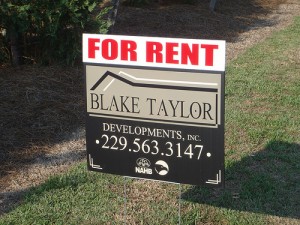As a young person, once you decide it’s time to move out of your parent’s house or upgrade from a college dorm room, the next step is to determine exactly where you want to live. You have two options for living situations. You can either rent, or you can buy. Unfortunately, there is no easy answer to whether to rent or purchase a home and the right decision for you depends on your financial situation, personal requirements and goals for the future.
Photo Credits: By faul on Flickr
Advantages of Renting
- Mobility- Renting prevents you from being tied to a specific location, giving you the flexibility to move if you desire. A renter’s lease typically lasts for 12 months and then you are free to relocate. If something comes up during that 12 month lease, you may be able to sell your contract if you find someone to take your place or you may have to pay a penalty. But when you’re young and in the process of figuring out what is most important to you, and looking for a career, one of the biggest perks of renting is that you aren’t tied down to one location for 15 or 30 years while paying a mortgage.
- No Maintenance- Renting is also much simpler and requires far less responsibility than owning a home. You aren’t responsible for repairing things when they break, such as the water heater or a leaky roof. All it takes is a simple call to the landlord and they will either make arrangements to fix it themselves, or pay for someone to fix it instead.
- Lower Expenses- As a tenant you are not responsible for things like Real Estate Taxes, Home Owners Insurance, Mortgage Interest and the cost of repairs. Although you will still need lower cost “Renter’s Insurance” to cover the cost of your contents you do not need to buy insurance for the entire building.
Disadvantages of Renting
Renting has its own set of disadvantages too.
- Rules- Landlords have the power to set rules about occupancy, pets, the property, decoration, among others. It isn’t uncommon for landlords to require you to move to do upgrades or if they want to allow a different tenant to move in. Depending on what is written into your lease agreement, you may only have 30 days to find a new place to move if they decide to rent to someone else or sell the property.
- No Equity- Many people compare renting to throwing money away because it is going directly into someone else’s pocket without building you any equity.
- Rent Increases- It isn’t uncommon for renter’s to experience regular rent increases where a fixed rate mortgage would lock in your monthly cost.
Advantages of Buying a Home
- Building Equity- The primary benefit of buying a home is that the money you’re paying toward your mortgage is being invested into your home in the form of equity. Equity is an asset, a form of ownership helping to increase your net worth and as you make your monthly payment it is a sort of forced savings plan. Unfortuantely, during the rapid increase in the value of houses from 2000-2008 too many people came to view this equity as an ATM machine and so they ended up owing more than the value of their homes when housing prices fell.
- Value Appreciation- Your home’s value may increase while you’re living in it due to the funds you spend to remodel or improve it. You may be able to recover these costs in the future if you decide to sell your home.
- Freedom- Unless you live in a neighborhood with a strict home owners association, buying a home also gives you the freedom to do what you want to it without consulting with a landlord first. You can change the paint, the carpet, the trim and anything else to suit your tastes. You can also have pets and won’t need to answer to a third party for major decisions.
Disadvantages of Buying a Home
Purchasing a home isn’t without its own set of drawbacks.
- Responsibilities- Unlike a renting scenario, as a homeowner, the onus is on you to fix major problems when things go wrong, regardless how large or small. Whether it’s a broken pipe or faulty thermostat, it’s up to you to fix it yourself, or pay a professional to fix it for you.
- Taxes- You’ll also incur unexpected expenses when buying such as property taxes, homeowner’s insurance and closing costs to before purchasing your home.
- Foreclosure Risk- Should you fall upon hard times and lose your job, your home may be at the risk of foreclosure if you are suddenly unable to pay your mortgage.
- Commitment- Buying a home will commit you to living in one area. If you get married, get a new job offer, or decide to travel the world for a year, you would have to sell or rent your home.
Lower housing prices, lower mortgage interest rates, higher demand for rentals due to foreclosures all shift the financial equation in favor of buying after many years of higher home prices, and lower rents. It takes more than comparing your mortgage payment to your rental payment to decide whether it is better to rent or own. To look at all the financial aspects of the decision see the Rent vs Own Calculator.
See Also:
- Are Rent to Own Home Programs Worth It?
- How Much House Can You Buy?
- Real Estate Investment Trusts
- Housing Prices and Inflation
- Housing Trends- Where are the Home Buyers?
- The Wealthy Buy Assets, the Poor Buy Liabilities, and the Middle Class Buy Liabilities Believing They Are Assets
Recommended from Amazon:
Rent vs. Own: A Real Estate Reality Check for Navigating Booms, Busts, and Bad Advice
Rent to Own: Use Your Rent Money to Get Started Owning Real Estate
Photo Credits: By faul


